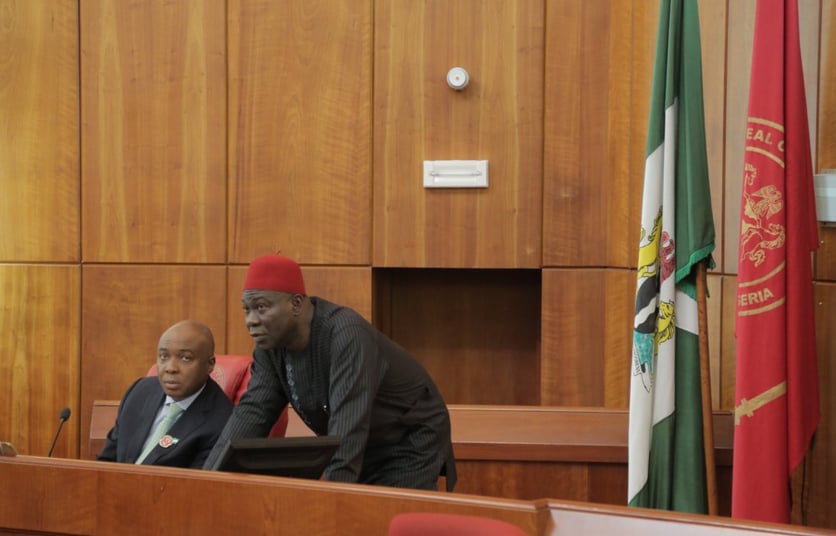The Academic Staff Union of Universities (ASUU) says the 2016 sexual harassment bill before the senate will undermine the autonomy of universities.
Biodun Ogunyemi, president of the union, said this at a public hearing on the bill, organised by the senate committee on judiciary, human rights and legal matters.
The sexual harassment bill was sponsored by Ovie Omo-Agege (LP- Delta Central) and co-sponsored by 57 other senators.
The bill seeks to criminalise sexual harassment in tertiary institutions and among other things, proposes a five-year jail term for lecturers found guilty of sexual harassment of students.
Advertisement
Ogunyemi said universities were established by law as autonomous bodies, adding that there were laws that clearly articulated redress procedures.
“As a global norm, universities and other tertiary institutions are established by law as autonomous bodies and have their own laws regulating their affairs,” he said.
“This includes misconduct generally among both staff and students, with clearly articulated appropriate redress mechanism.
Advertisement
“Any law or bill which seeks to supplant these laws violates the university autonomy.
“In this particular instance, the bill violates the federal government of Nigeria and ASUU agreement of 2009 and as such should be rejected.”
He said that the bill was discriminatory because it was targeted at educators.
According to Ogunyemi, it is unfair to come up with such a bill; sexual harassment is a societal problem and not peculiar to tertiary institutions.
Advertisement
He also said that the bill was a violation of section 42(1) of the 1999 constitution, adding that it was embarrassing that the legislative arm could seek to make such law that would violate the constitution.
Ogunyemi also pointed out that besides violating the constitution, the bill failed to take cognizance of various extant legislation that adequately dealt with sexual offences.
Faulting the bill, he said it failed to provide convincing evidence to show that sexual harassment in tertiary institutions had attained a higher magnitude than other spheres of the society.
“The bill is discriminatory, selective, spiteful, and impulsive and lacks logic and any intellectual base by attacking the character and persons of those in tertiary institutions rather than addressing the issue holistically,” he said.
Advertisement
“Furthermore, the bill is dangerous and inimical to the institutions as it contains several loose and ambiguous words and terms which could also be used to harass, intimidate, victimise and persecute, especially lecturers, through false accusation.”
The National Universities Commission (NUC), on the other hand, supported the introduction of the bill “in view of its relevance” and called for its passage.
Advertisement
Julius Okogie, executive secretary of the commission, said while federal and state universities had administrative structures for handling grievances, there was nothing wrong in having a legislation to help with that.
“University miscellaneous provision act gives them power to formulate policies and by-laws to guide them and most institutions have structures to handle these incidences,” he said.
Advertisement
“However, there is nothing wrong if there is a legislation to add to what is on ground. We are only saying that universities are doing something about sexual harassment, which may not be enough”.
Okojie called on the senate to extend the scope of the bill to cover primary and secondary schools.
Advertisement
1 comments







This bill if enacted into a law is;
1)Discriminatory against Educators (Academic and Non-Academic) in Tertiary Institutions: According to Chapter IV, section 42 (1), it states “A citizen of Nigeria of a particular community, ethnic group, place of origin, sex, religion or political opinion shall not, by reason only that he is such a person;
a) Be subjected either expressly by, or in the practical application of, any law in force in Nigeria or any executive or administrative action of the government, to disabilities or restrictions to which citizens of Nigeria of other communities, ethnic groups, places of origin, sex, religions or political opinions are not made subject”
b) Be accorded either expressly by, or in the practical application of, any law in force in Nigeria or any such executive or administrative action any privilege or advantage that is not conferred on citizens of Nigeria of other communities, tribes, places of origin, religions or political opinions.
From the above provisions of the Nigerian Constitution, it is clear that this bill contravenes the Nigerian Constitution and thus discriminatory against persons of a particular community ‘Educators in Tertiary Institution’ and it cannot be disputed that Sexual Harassment is everywhere; Churches, banks, even National Assembly etc. No wonder, Senator Biodun Olujimi during the second reading said “Sexual Harassment is everywhere and that Ladies are used as baits in banks to get bankable funds” she further recommended that when the bill is committed to the Judiciary and Human Rights Committee, they should expand the bill to be more inclusive. Also Senator Binta Masi Garba, supported the expansion of the bill and recommended that it should be inserted into the Penal Code and Criminal Code Act and it should capture sexual/marriage of minors. From Senator Binta Garba recommendation, it could be deduced that, there is no need for a new law but insertion of some clauses of Sexual Harassment Bill into the Penal Code and Criminal Code Act so that it will be all inclusive. Even Senator Dino Melaye, said, “female students having dressed offensively harass their lectures by offering to sleep with them”. A provision in this regard was not made to protect the lecturers from sexual harassment by students.
2) Provisions of Sexual Harassment in Tertiary Institutions are repetitive of existing laws in (VAPP) Violence against Persons (Prohibition) Act. 2015 and Penal and Criminal Code Act: According to Part 1, Section 5, subsection (1, 3) of the VAPP Act;
5 (1) A person who compels another, by force or threat, to engage in any conduct or act, sexual or otherwise, to the detriment of the victims physical or psychological well-being commits an offence and is liable on conviction to a term of imprisonment not exceeding 2 years or to a fine not exceeding five hundred thousand naira or both.
5 (3) A person who incites, aids, abets, or counsels another person to commit the offence provided for in subsection (1) of this section commits an offence and is liable on conviction to a term of imprisonment not exceeding 1 year or to a fine not exceeding three hundred thousand naira or both.
Also Section 14, 18, 22, and 26 of VAPP Act made provision for protection of persons from emotional, verbal and psychological abuse, intimidation (harassment), administrating a substance with intent and indecent exposure/dressing – a provision the Sexual Harassment in Tertiary Institution bill did not make to protect lecturers from been harassed by students.
To give a better Interpretation of Sections 5, 14, 18, 22 and 26, Part VI (Interpretation), Section 46 of the VAPP Act gave interpretation to sexual abuse, sexual assault, sexual exploitation, sexual harassment, and sexual intimidation. I will like to state the interpretation given to Sexual intimidation (harassment) because provisions in the Sexual Harassment by educators in Tertiary Institution bill were well captured.
Sexual Intimidation (Harassment) was interpreted in VAPP Act, 2015 as:
a) any action or circumstances which amount or demand for sexual intercourse with either a male or female under any guise, as a condition for passing examination, securing employment, business patronage, obtaining any favour in any form, as defined in this act or any other enactment.
b) the actual demand for sexual intercourse with either a male or female under any guise, as a condition for passing examination, securing employment, business patronage and or obtaining any favour in any form, as defined in this act or any other enactment.
c) acts of deprivation, withholding, replacing or short-changing of entitlements, privileges, rights, benefits, examination or test marks or scores, and any other form of disposition capable of coercing any person to submit to sexual intercourse for the purpose of receiving reprieve threats; or
d) any other action or inaction construed as sexual or harassment under any other enactment in force in Nigeria.
From the above it is clear that provisions of the VAPP Act, covers provisions in the Sexual Harassment to students by Educators in Tertiary Institution Bill, 2016 and VAPP Act is even more holistic since it serves to protect both students, lecturers and all Nigerians and thus not discriminatory. Also some of the provisions made in the Penal Code and Criminal Code Act also capture some provisions of the Sexual Harassment in Tertiary Institution Bill, so it is repetitive of existing laws and not necessary.